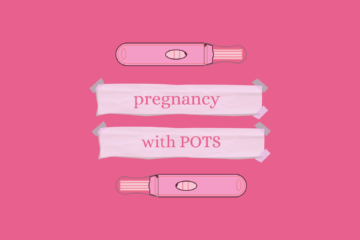When people think of POTS symptoms, the ones that come to mind are typically passing out or nausea or something physical, but they rarely think about the mental side effects of dealing with an invisible disability with POTS. Some of the biggest mental side effects of being a potsie are grief, imposter syndrome, and anxiety.
Grief as an emotion can come in a multitude of different forms and stem from so many different things. Living with a disability, especially one as limiting as POTS, can evoke a strong sense of loss. This loss can manifest in many different ways, from grieving over the things that you can’t do or experience or participate in, to mourning over what you have experienced in your journey. Even seemingly insignificant things can trigger grief in potsies like witnessing healthy people walk around and exercise with ease or being forced to miss a gathering with friends and family because symptoms are too bad.
For me, grief is like a constant companion. I mourn daily who I was when my symptoms were barely there. It breaks my heart having to cancel on people or turn down invitations because my body doesn’t want to work correctly. I grieve for future me who will undoubtedly have to face judgement and negativity from so many people who who fail to understand the complex difficulties of living with a disability. Furthermore, I even experience sadness about all of the relationships I have lost and will lose due to my disability. This truth is especially painful even though I recognize that those who refused to offer me support were ultimately not meant to be in my life.
Adding to the emotional burden of grief, imposter syndrome frequently makes it’s way into the minds of so many people living with disabilities. Imposter syndrome defined is “a behavioral health phenomenon described as self-doubt of intellect, skills, or accomplishments among high-achieving individuals.”(National Institute of Health) This phenomenon is especially prevalent among those with invisible disabilities like POTS. The invisibility of the condition often leads to skepticism from others, who may doubt the severity of the symptoms because they don’t personally know what it feels like. This doubt and dismissal from other people, whether it is intentional or not, makes it so easy for potsies to doubt themselves and invalidate their experiences living with POTS.
Throughout my own journey, I have found myself thinking things like “My symptoms aren’t as severe as other people with POTS. Do I even count as a potsie?”, “I’m feeling relatively okay today. Was I just exaggerating how bad my symptoms were yesterday?”, or “The doctors say my tests are coming out normal, but I still don’t feel right. Am I just imagining things?” When others dismiss your symptoms and tell you that you are being dramatic about how you feel, it’s nearly impossible to avoid questioning your own reality.
Anxiety and POTS share a complex and often confusing relationship. So many potsies are initially misdiagnosed with anxiety while trying to get their POTS diagnosis because there are many overlapping symptoms. POTS can mimics the feelings of anxiety with symptoms like heart rate changes, sweating, and shortness of breath. Along with the overlap in symptoms causing potsies to feel like they are anxious when they are just having a POTS flare up, dealing with other POTS symptoms can also trigger actual anxiety. Triggers for anxiety in potsies can range from the fear of passing out in an unsafe place, not having anyone trusted around during a bad flare up, or just the uncertainty of having to navigate daily activities.
I have always been an anxious person, but when my symptoms started getting worse after I got Covid, my anxiety reached a new level. I started getting anxious about what my body would decide to do or not do every time I left the house. I worry about if I can get through grocery shopping without having to lay down in the middle of the isle, or if I can stand in front of class for five minutes to do a presentation without collapsing, or if I can even get up to go to the bathroom without falling and hitting my head.
POTS symptoms are much more than the physical. Those with disabilities have to fight just as much emotional side effects as physical side effects. Seeking support from other individuals with POTS, as well as family and friends, and advocating for yourself and how you actually feel are crucial steps in managing the complexities of living with POTS.
Be sure to subscribe to my emails and follow my socials to stay up to day with all things Power in POTS! < 3
Also check out my latest blogs “Dysautonomia/POTS Organizations“, “A list of some common co-occurring conditions to POTS” and “What exactly is Postural Orthostatic Tachycardia Syndrome (POTS)?”



1 Comment
Olga · November 22, 2024 at 9:23 am
As a nurse it is so important to remember that there are mental health connections when leople have physical sybdrome. Tbank you for pointing it out to share with medical providers the .ental health aspects of chronic disorders.